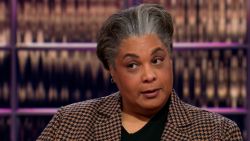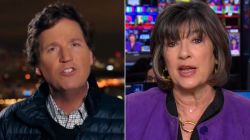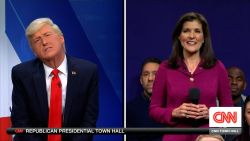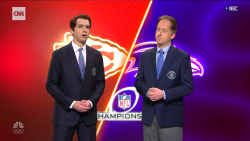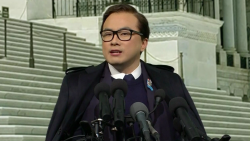One of the most consistent features of the chaotic Trump presidency are the attacks against the press.
President Donald Trump and his allies tell the public almost daily not to believe real reporting. But the frequency and predictability of the attacks don’t make them any less damaging. To the contrary: The falsehood-filled tweets and televised tirades are gradually eroding Americans’ shared sense of reality.
Monday was a prime example. Trump shared 22 posts on Twitter before noon. In between his quotes from Fox News and his retweets about Hurricane Dorian, he blasted the Washington Post and spread misinformation about how major newsrooms operate.
He also shared a key line from his re-election playbook, claiming that “our primary opponent is the Fake News Media,” not the Democrats.
Some of what Trump posts about the media is legitimate criticism, but much of it is misleading. At the root of it all is a lie: That legitimate news outlets are “fake.”
When he says journalists routinely make up sources out of thin air, for example, he has no proof for the charge. He either misunderstands how the press operates or is misleading people on purpose. He’s been saying it for years, and he’s been corrected for years, so at this point the latter is more likely.
Monday’s insults were typical: Trump said “they write whatever they want, seldom have sources (even though they say they do), never do ‘fact checking’ anymore, and are only looking for the ‘kill.’”
With regards to fact-checking, the White House press office receives fact-check inquiries from reporters every day. The press office sometimes responds and other times declines to comment.
Trump continued, “They take good news and make it bad. They are now beyond Fake, they are Corrupt… The good news is that we are winning. Our real opponent is not the Democrats, or the dwindling number of Republicans that lost their way and got left behind, our primary opponent is the Fake News Media. In the history of our Country, they have never been so bad!”
In other words, just another day for Trump – another outburst at an institution enshrined in the Constitution to keep government honest. Previous presidents mostly tolerated an independent press at home, and proudly championed it as a truly American ideal while abroad.
The tweets may have been prompted by a story in Monday’s Post titled “Trump’s lost summer: Aides claim victory, but others see incompetence and intolerance.” The deeply reported story included several on the record sources.
Trump tweeted on Monday morning about a passage in the story involving his “racist attack” against the Democratic lawmakers nicknamed the “squad.” He denied that his tweets were actually racist and claimed that “they brought racist attacks against our Nation.”
From there, he launched into his broader anti-media message.
In recent days he has taken aim at a variety of outlets, from Axios to CNN, from Fox to the Post.
Maggie Haberman of The New York Times, who’s also a CNN political analyst, tweeted out an observation that a Trump adviser shared with her weeks ago: “That the president, whose own approval ratings have stayed upside down, needs voters to feel negatively not just about his opponents but about longstanding institutions.”
Mark Follman, national affairs editor for Mother Jones, said last week that “Trump’s incessant war on the American press has grown more extreme as his presidency has gone on.”
And he noted the potency: While the tactics “represent an inherently dangerous attack on a pillar of our constitutional democracy, Trump’s multiyear campaign against the press appears to have been no more successful a project than, say, Trump Tower Moscow.”
The president sometimes seizes on ethical lapses to bolster his case – a form of argument by anecdote that is certainly persuasive to his fans but isn’t factually sound.
Last week, for instance, Trump called out MSNBC’s Lawrence O’Donnell for a reckless TV segment about his finances. O’Donnell cited a single unnamed source and didn’t go through the network’s proper vetting process – and he was widely criticized for the misstep. After a legal threat from one of Trump’s lawyers, O’Donnell apologized for making the claim and retracted it. The episode was embarrassing for MSNBC.
Trump doesn’t seem to register the same embarrassment when he misspeaks. For a news anchor, slip-ups involving an emergency situation like Hurricane Dorian are a big deal. But Trump has repeatedly misstated facts about Dorian without any apparent follow-up or correction.
On Sunday afternoon, for instance, while rightly urging residents along the East Coast to take the storm warnings seriously, he wrongly invoked another state that’s not actually in the path of the storm.
“And, I will say, the states — and it may get a little piece of a great place: It’s called Alabama,” Trump said on camera at FEMA headquarters. “And Alabama could even be in for at least some very strong winds and something more than that, it could be. This just came up, unfortunately.”
“Alabama, just please be careful also,” he added.
Earlier in the day he also included Alabama in a tweet about threatened states. Local meteorologists quickly corrected him to no avail. So did the Birmingham office of the National Weather Service, which is part of the executive branch of the government.
“Alabama will NOT see any impacts from #Dorian,” the NWS Birmingham office tweeted. “We repeat, no impacts from Hurricane #Dorian will be felt across Alabama. The system will remain too far east.”





